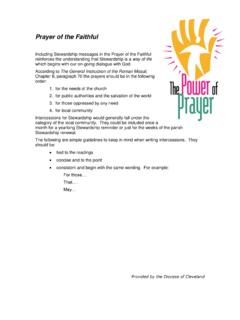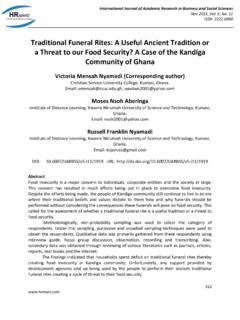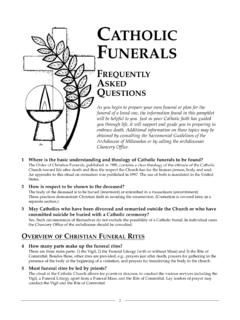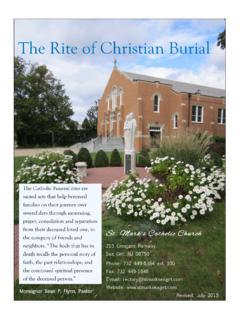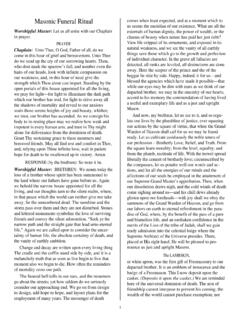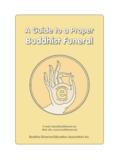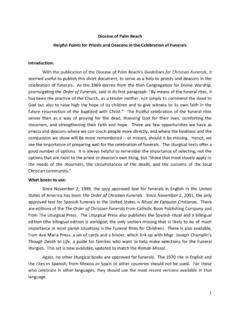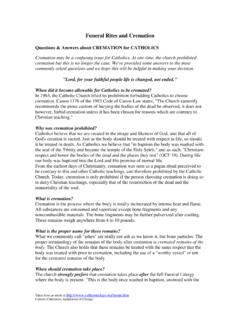Transcription of Liturgical Norms Funerals
1 Liturgical Norms for the celebration of funeral rites includes the guidelines for speaking in Remembrance and planning guides for the vigil and funeral Mass diocese of fort Wayne - south bend June, 2001 reprinted November, 2005 Liturgical Norms for the Celebration of funeral Rites in the Diocese of Fort Wayne-South Bend, IN Promulgated by Bishop John M. D Arcy June, 2001 reprinted November, 2005 A Christian Understanding of Death Page 3 Celebration of the Liturgy: General Principles Page 5 Frequently Asked Questions about Christian Funerals Page 9 Outline of the Rites Vigil for the Deceased Page 13 funeral Mass Page 14 funeral Liturgy Outside Mass Page 17 Rite of Committal
2 Page 18 Diocesan Guidelines on Speaking in Remembrance Page 19 Diocesan Guidelines on Speaking in Remembrance Page 20 reprintable format Sample Liturgy Preparation Sheet Page 21 Thank you to the Diocesan Music Committee for developing the Liturgical Norms for the Celebration of funeral Rites, with music suggestions and to the Diocesan Liturgical Commission for developing the Diocesan Guidelines on Speaking in Remembrance of the Deceased. 23 22 A CHRISTIAN UNDERSTANDING OF DEATH Death and passing over into eternal life are mysteries at the center of our Catholic Christian faith.
3 Though our popular culture at times recoils from death and denies its reality, In the face of death, the Church confidently proclaims that God has created each person for eternal life and that Jesus, the Son of God, by his death and resurrection, has broken the chains of sin and death that bound humanity (OCF, #1). A CELEBRATION OF THE CHURCH Christian Funerals are not private observances, but celebrations of the whole church, in which Christians celebrate the funeral rites to offer worship, praise, and thanksgiving to God for the gift of a life which has now been returned to God, the author of life and the hope of the just (OCF, #5).
4 These rites are celebrated, therefore, with appropriate choices of music, readings, gestures, and decorations which are consistent with a Catholic Christian understanding of death. When we celebrate the Order of Christian Funerals , we gather not only to remember the deceased, but also to comfort one another. The celebration of the Christian funeral brings hope and consolation to the living. While proclaiming the Gospel of Jesus Christ and witnessing to Christian hope in the resurrection, the funeral rites also recall to all who take part in them God s mercy and judgment and meet the human need to turn always to God in times of crisis (OCF, #7).
5 3 MINISTRY TO MOURNERS THE ROLE OF COMMUNITY The celebration of a Christian funeral is a time for members of the community to come together. St. Paul tells us, If one member suffers in the body of Christ which is the Church, all the members suffer with that member (1 Corinthians 12:26). No one is to be isolated in grief and mourning but to see the outstretched hands of fellow Christians, ready to help. For those who are baptized into Christ and nourished at the same table of the Lord are responsible for one another (OCF, #8). All the baptized, then, are called to comfort those who have lost a loved one. THE ROLE OF THE MINISTERS Pastors and their associates play a special role as teachers of faith and ministers of comfort (OCF, #14).
6 Outside of Mass, when no priest is available, a deacon may preside at the funeral rites; when no priest or deacon is available for the Vigil and the Rite of Committal, a layperson presides. In addition to those who preside at the funeral rites, laypersons may serve as readers, musicians, pallbearers, and extraordinary ministers of Holy Communion. Both ordained and lay people must exercise their ministries with reverence and great care, that they may truly bring consolation to the mourners. Family members should be encouraged to take an active part in these ministries, but they should not be asked to assume any role that their grief or sense of loss may make too burdensome (OCF, #14).
7 THE ROLE OF THE PARISH The parish is a community of Christian believers, and it is an organization with resources made available in the ministry of consolation. Parish members, therefore, should see each funeral as a parish celebration, not a gathering of strangers. The parish and its members should assist the mourners in their need and in preparing the funeral rites. Priests, musicians or other pastoral ministers meet with the family to prepare the funeral rites, and to offer prayer and comfort. The parish celebrates the liturgy at all times with reverence and joy, filled with the spirit of Christian hope. Such Liturgical celebrations are a model for the celebration of the funeral rites.
8 4 A SAMPLE LITURGY PREPARATION SHEET 21 Guidelines for Speaking in Remembrance in the Diocese of Fort Wayne-South Bend 1. The vigil of the deceased, the farewell at the cemetery and the consolation din-ner are the most appropriate times for giving tributes and anecdotes about the deceased. 2. If done within the context of the Eucharistic Liturgy, the following guidelines apply: Speaking in Remembrance must be a reflection on the life of the deceased in the context of his or her faith. There should only be one person speaking, not a series of people. Whoever is chosen to speak should be someone who can maintain self-control.
9 The appropriate length of time for the talk should not exceed two minutes. The remembrance should be given from a lectern, not from the Ambo. The speaker should write his or her remarks and review them with the presider well in advance of the funeral Mass. A vita of the deceased could be prepared and distributed in lieu of speaking at the Mass. Recordings and videos are never appropriate for the funeral liturgy. 20 CELEBRATION OF THE LITURGY GENERAL PRINCIPLES THE WORD OF GOD IS PROCLAIMED Readings A careful selection and use of readings from Scripture from the funeral rites will provide the family and the community with an opportunity to hear God speak to them in their needs, sorrows, fears, and hopes (OCF #22).
10 The readings are most often chosen from the lectionary. Non-biblical readings may not replace the biblical readings. Well prepared readers and the deacon proclaim the readings. The presiding minister proclaims the readings only when there are not assisting ministers present (OCF, #24). Psalms The psalms give poetic voice to our suffering and pain, our hope and trust. They are the words that Jesus himself used in prayer during his life on earth. The psalms provided for the funeral rites are eloquent communal prayers when sung between the readings, during the processions, during the vigil for the deceased, etc. The beauty of their musical settings enhances the prayerfulness of the psalms.
